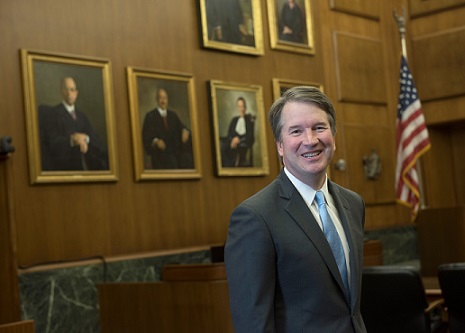Stanford affiliate Christine Blasey Ford has come forward as the author of a letter sent to Senator Dianne Feinstein ’55, the Washington Post reports. Ford’s letter, the contents of which became public Friday, accuses Supreme Court nominee Brett Kavanaugh of sexually assaulting her at a high school party in the early 1980s.
Ford, who uses the name Christine Blasey professionally, is a professor at Palo Alto University and teaches in a consortium with Stanford. Per her official University profile, Ford works in psychiatry and behavioral sciences.
She has reportedly been in contact with The Post for weeks regarding her letter but was previously only willing to speak on background, meaning The Post could not quote or attribute anything to her.
In early July, prior to Kavanaugh’s nomination to the Supreme Court, Ford submitted a tip to The Post and contacted 18th Congressional District Representative Anna Eshoo, who represents both Palo Alto and Stanford. On July 30, the letter — including Ford’s request to keep the matter confidential — was reportedly sent from Eshoo’s office to Feinstein.
Now, with the allegations having reached national prominence and reporters visiting her at home, Ford has decided to publicly identify herself.
In an interview with The Post, she reiterated and elaborated on the claims made in the letter sent to Feinstein and Eshoo, saying that Kavanaugh pinned her down on a bed and groped her over her clothes while attempting to undress her, as a friend of his watched. Kavanaugh also put his hand over her mouth when she tried to scream, she said.
In a statement issued when the allegations initially became public, Kavanaugh said he “categorically and unequivocally” denied such an incident having ever occured.
Kavanaugh’s high school, Georgetown Preparatory School, and his high school friend, Mark Judge — whom Ford identified as the second boy in the room at the time of the assault — have both denied knowledge of the alleged incident.
Feinstein, who is the senior Democrat on the Senate Judiciary Committee, shared the contents of the letter, but not the letter itself, with fellow committee Democrats Wednesday. She also referred the letter to the F.B.I., which added it — with Ford’s name redacted — to Kavanaugh’s background check folder.
The F.B.I. said Thursday that it had not opened an investigation into the allegations.
Ford hired Debra Katz, an attorney known for her past work on sexual harassment cases, to represent her. In early August, Ford reportedly took a polygraph test — commonly used to detect lies — administered by a former F.B.I. agent. Katz, who recommended Ford take the test, later provided the The Post with the results, which maintain that Ford told the truth when she affirmed the accuracy of her allegations against Kavanaugh.
Ford did not discuss specifics of the incident with anyone for decades, The Post reports, although she did tell her husband early on in their relationship that she’d been a victim of physical abuse.
The two married in 2002, and during couples therapy in 2012, Ford recounted having been assaulted by students of “an elitist boys’ school” who later became “highly respected and high-ranking members of society in Washington,” according to her therapist’s notes, reviewed by The Post.
In an interview with The Post, Ford’s husband said the incident she described in 2012 was the same one that would eventually be outlined in her letter.
Ford’s husband also said that Ford specifically named Kavanaugh during therapy, and that she worried he might one day be nominated to the Supreme Court.
Following the reveal of Ford’s letter, a spokesperson for Judiciary Committee Chair Charles Grassley — the Republican senator who set the timeline for Kavanaugh’s confirmation — told The New York Times that Grassley has no plans to delay the committee’s vote on Kavanaugh, which is set to take place this Thursday.
This report has been updated to reflect that the vote planned for Thursday is a committee vote rather than a confirmation vote. It will be updated further as new details and perspectives emerge.
Contact Brian Contreras at brianc42 ‘at’ stanford.edu and Holden Foreman at hs4man21 ‘at’ stanford.edu.
